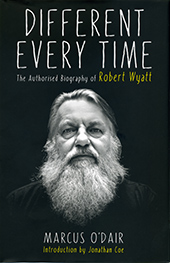Different Every Time:
The Authorised Biography Of Robert Wyatt
By Marcus O'Dair
Serpent's Tail 2014, £20.00, pp460
A rapidly approaching 70th birthday and a compositional output
that, while never exactly torrential, has become increasingly drier with the passing
of time give this Robert Wyatt biography (his first one, written with Robert's full
participation, according to the book's blurb) a peculiar taste of closure. But
readers are invited not to feel any sense of sadness, since - in spite of the
many dramatic episodes that have punctuated Wyatt's life - at the end of the
book one is left with a feeling of triumph against adversities, the artist's
travelogue full of bends not always making immediate sense, but with many fine
episodes appearing side-by-side with those acknowledged masterpieces.
One
thing I want to make clear is that this biography is the outcome of a precise,
scrupulous, professional work - something one cannot take for granted anymore
in the age of the Internet and of the dangerous weapon called "copy &
paste", which often produce works totally devoid of any fresh insight and
original perspective. A new name for me, Marcus O'Dair writes in a clear,
functional style, his prose in harmony with his long CV.
Four
hundred pages of narration that flow quite lightly, the reader's gaze being
often and happily distracted by an enormous quantity of pictures and drawings
which enrich and enliven the narrative. There's also a "selected"
discography which will prove to be a source of investigation and discovery for
many years. The author's use of already published material is clearly indicated
in a long section of the end of the book. O'Dair has also interviewed about
seventy people who have met Wyatt, and who offer first-hand perspective, much
info, and even a few spices.
(Two
funny mistakes: the word "photogaphs" which appears on p.434, and
the letter "F" that appears in place of the letter "H" on
p.444, in the general index.)
Who's
the targeted reader of this book? A legitimate question, especially now that
people's aversion when it comes to reading appears to be at an all-time high.
Obviously, it depends on one's age, also on one's cultural/geographic
coordinates.
By
now hidden, scattered, and subterranean, there once was a slice of the
"rock" constituency for whom the sequence Soft Machine (especially
their albums Volume Two and Third), The End Of An Ear, Matching Mole, and Rock
Bottom possessed a self-evident inner logic. Those "rock" fans could
be found more on European ground than in the United States (where
"rock" meant something else, and where Wyatt has always been, at the
most, a "cult artist" - something which is bound to sound absurd to
an Italian fan who was a teenager in the 70s), and more in Continental Europe
than in the U.K.
If
we remember that in the 70s a group like Hatfield And The North could be said
to represent "the easy portion" of the rock spectrum, and if we take
into consideration those who liked Henry Cow circa Concerts, and News From
Babel's Letters Home - both albums featuring Robert Wyatt - well, there's a lot
of people.
But
there are also a lot of other people who discovered Robert Wyatt thanks to
those singles he released on Rough Trade at the time the "new wave"
was all the rage; those people will maybe find quite a few surprises waiting
for them in this book.
Strange
to say, given the "cult" dimension of his success, with the passing
of time Robert Wyatt has become something like an "elder statesman",
somebody whose many interests have their foundation on a moral basis, and whose
political engagement - moving along both class and Third World coordinates - is
in line with those categories shared by many "rock" fans of the time.
If
what I've said up to now makes any sense, it'll become clear that this is not a
biography that's limited to the sphere we call "music" - something
which would be impossible, by the way, given the fact that Robert Wyatt is a
perfect specimen of the mix of the "personal" and the
"political". So we can read about a complex thread made of biographical
events, musical collaborations, and changing perspectives, where a clear
narration never gives the protagonist an easy way out when something unpleasant
happens.
As
it is to be expected, a large part of the story sees life-long partner and
collaborator Alfreda Benge sharing the spotlight. Quite a few interesting
comments and insights are offered by Chris Cutler and Brian Eno (by the way: Am
I the only one who's surprised upon reading that the music for the quite famous
Wyatt piece O Caroline was written by Dave Sinclair?).
What's
missing? In a way, nothing. From childhood to maturity, from Soft Machine (it
was quite a surprise for me to learn about that strained relationship) to those
experiences pre- and post- the fall that made him a paraplegic, to his strong
addiction to alcohol (for this reader, quite a surprise) the book is reasonably
complete.
Sure,
I would have preferred to have more "musical topics" discussed,
starting with Wyatt's admirations towards many great jazz drummers and their
influence on his own drumming: something that could maybe be clear for acute,
knowledgeable listeners of the time, but which has become increasingly opaque
with the passing of time. Of course, there will be those who will not share
O'Dair opinions about the most recent chapters of Wyatt's discography. I would
have liked to read more about some old chapters of Wyatt's life. For instance,
his plan - one he shared with Brian Eno and Phil Manzanera - to start a
recording studio/conference room/art gallery, which came to a halt for lack of
funding and which would make the whole "pre-punk" scene appear less
monolithic. But this is O'Dair's book, of course, not mine.
Beppe Colli
©
Beppe Colli 2014
CloudsandClocks.net
| Dec. 10, 2014











